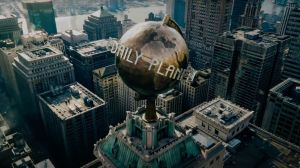
Marvel Comics is delighting fans new and old in the month of October by bringing back their line of “What If” comics with a handful of new entries each week. They have already delivered two stand-out one-shots from some of their best talent in 2018. One issue features one small, but consequential change to the Marvel universe with Flash Thompson being bitten by the spider instead of Peter Parker. Another delivers a version of the X-Men in which the characters are focused on changes to humanity in a digital landscape. Both instances capture the spirit of the “What If” line with very different approaches, and quickly build radically different worlds filled with the same superheroes but very new possibilities.
Videos by ComicBook.com
The excitement found in a “What If” story isn’t difficult to detail. There’s a reason this sort of question has always been popular fare at parties and the foundation of fan fiction across the /internet. It simply seems like a human instinct to pose the what if question, which makes its combination with Marvel Comics all the more thrilling. While the current round of “What If” stories are part of the five-week October publishing schedule, a special treat for dedicated weekly warriors, the concept has a much longer history at the publisher. The very first issue of What If… debuted in 1977 and featured Uatu the Watcher as the series’ dedicated narrator peering into alternate realities. Since that first series ended, What If… has been revitalized in many ongoing and miniseries. The current incarnation of October one-shots is the 13th volume so far.
The idea of the “What If” story has been part of Marvel Comics’ DNA for more than 40 years, most of the publisher’s existence. So what is it about this story idea which, by its very nature, holds no consequences on continuity that makes it so consistently compelling?

What Makes Marvel Comics Unique
Before digging into what made What If… special when it began in 1977, it’s worth taking a quick look at what made the entirety of Marvel Comics stand out when it exploded into existence with Fantastic Four #1 in 1961. Unlike the slow amalgamation of multiple unique properties at DC Comics, Marvel Comics always intended for its heroes to share a universe. While this was initially presented through largely inconsequential references and brief crossovers, it was purposeful and planned. This served to build a world in which an event in any issue could later have an impact on any other story, across many years or series.
This design alone radically changed superhero comics, but Kirby, Lee, Ditko, and their other collaborators created a seismic shift in the style of stories being told as well. Not only did these narratives continue in a connected fashion over months, but they all featured heroes with prominent flaws who regularly made mistakes. In Fantastic Four #1 the team gains superpowers because Reed Richards made a mistake in his plans for their space launch, resulting in his best friend’s permanent disfigurement. Spider-Man’s vanity and selfishness result in the murder of his beloved Uncle Ben in Amazing Fantasy #15. These mistakes were not just the fare of origins. Any reader of early Marvel Comics, but especially Amazing Spider-Man, knows how regularly the Marvel superheroes blundered on their way to saving the day.

Every Decision Matters
This important shift towards a cohesive continuity and flawed superheroes made for a universe where the consequences of each decision would be felt. While it is easy to tweak the origins of a superhero in order to create a new narrative, Marvel Comics provided readers with bundles of important turning points each year. Returning to the Fantastic Four, they regularly shifted the course of the entire publishing line by returning Namor the Sub-Mariner to the world, opening up travel to Attilan and Wakanda, and playing a key role in stopping multiple global threats. In the first five years of Fantastic Four history, there are hundreds of essential decisions that would not only impact the history of this one superhero team, but New York City and the entire Marvel universe. This focus on key moments that continue to play out across time, felt in each subsequent issue is what makes the question of “what if” so attractive in Marvel Comics.
It can be easy to take certain elements of Marvel Comics for granted after more than 50 years of history. Spider-Man’s altruism is such an essential part of the character that it can be easy to ignore all of his struggles in becoming an iconically selfless hero in this era. The “what if” story allows readers to not only examine an alternate timeline, but to be reminded of what built the current status quo. These stories have the entire range of Marvel history available to them and often focus on early events that would shape decades of future stories. Small moments in the life of the Hulk or Hawkeye spin out across the years in unexpected directions and the inherent value of each decision at Marvel Comics makes them worth reexamining through this lens.

The Constant Expansion of History
While the early years at Marvel Comics receive a lot of attention, their superhero stories haven’t slowed at all since 1961. Each year is filled with new tales, changes, and characters that all serve to expand the already tremendous Marvel universe. As time and these superhero stories both move ever forward, new questions are raised about key moments and decisions. It is why many of the most recent volumes of What If… have focused upon key elements in event comics with moments from Infinity and Age of Ultron opening up new worlds of possibilities.
Even if Marvel Comics were to stop publishing new stories today, there would already be enough fare available for a seemingly endless array of “what if” comics. That’s not the case though and with so many great, new issues coming out each Wednesday, there’s barely enough time to ask the seemingly most interesting “what if” questions. As long as there is a superhero universe where choices matter, there will be a need for a new volume of What If…, a comic that is also a testament to the unique creative energy released by Marvel Comics in 1961 and ever since.









